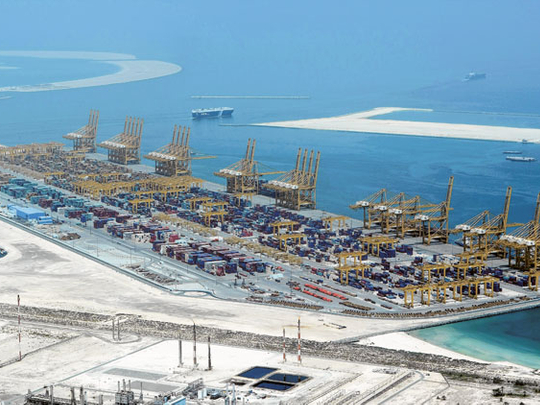
Dubai: Unrest across the Middle East and increased scrutiny over exports to Iran are unlikely to impact trade through the regional hub Dubai, and volumes are expected to rise 16 per cent in 2011, the emirate's customs head said.
Trade volumes in Dubai, a key trade and tourism gateway to the UAE and wider Gulf region, climbed last year on easing concerns about Dubai's restructuring and the global recovery.
"We expect non-oil direct trade to reach Dh1.2 trillion ($327 billion) in 2015. That is an average growth of 16 per cent per year," Ahmad Butti, director general of Dubai Customs, told Reuters in an interview on Sunday.
Dubai's non-oil direct trade, which excludes free trade zones, reached Dh576 billion in 2010, up 18 per cent from the previous year, customs data showed.
Despite booming trade, analysts expect the UAE, the second-largest Arab economy, to lag behind its Gulf peers due to the impact of debt restructuring. Prospects improved after state conglomerate Dubai World sealed a deal to restructure nearly $25 billion in debt in September.
The emirate's gross domestic product should rise by 2.8 per cent this year, the International Monetary Fund forecasts, up from 0.5 per cent in 2010. Dubai accounts for almost a third of the UAE's GDP and for around 80 per cent of its non-oil trade.
A new airport — billed as the world's largest once fully operational — the logistics sector, expansion of the sea port and tourism are seen as key drivers for growth. "Air freight is expected to increase by around 48 per cent by 2015 because of the Al Maktoum Airport. Sea freight will increase 12 to 13 per cent per year," Butti said.
He also said trade with Dubai was unlikely to be directly affected by protests that toppled the leaders of Egypt and Tunisia, have threatened the government in Libya and have spread to Gulf countries including Bahrain, Oman and Saudi Arabia.
Iran trade
Dubai's ties with Iran have long drawn scrutiny from the United States and Western nations seeking to isolate Tehran over its nuclear activity, which the West fears is aimed at developing bombs. Trade of mostly consumer goods between Dubai and the Islamic Republic reached Dh27 billion in 2010, up around 12 per cent from 2009, Butti said, adding that trade activity would see similar growth this year.
Iran ranked second among Dubai's re-exporting trade partners, accounting for 17 per cent, followed by Iraq with 5 per cent, data showed.
"We have X-ray machines which scan 60 to 70 per cent of trade," Butti said. "I would like to assure you that we follow the United Nations requirements on what to export and what not."
The UAE has signalled that it will rein in its role as a trading and financial lifeline for Iran, after the UN Security Council imposed a fourth round of sanctions on Iran in June.
Drugs, chemicals, and weapons were the main goods destined for Iran that have been seized at the customs, Butti said.
Dubai Customs levies a 5 per cent duty on most goods, but 100 per cent on tobacco products and 50 per cent on alcohol.












